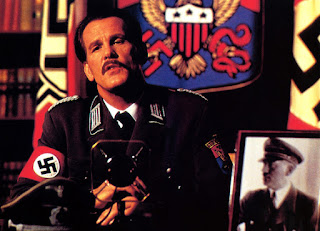While I have read about George Martin’s performance at the 2020 Hugo Awards, I have not watched his self-indulgent antics myself. 150 minutes is too much time to spend in the cramped emotional world of yet another Horrible Old White Guy, and I used up my quota of horrified fascination watching another member of that species, Daniel Feller, embarrass everyone at the SHEAR (Society for Historians of the Early American Republic) conference last month. The two debacles did bear some similarity to one another. Both Feller and Martin were given a large online platform and a much larger audience than usual, and abused both. Both lionized formerly-respected and now justly-despised heroes of the past, in Feller’s case the murderous Andrew Jackson, in Martin’s the fascist sci-fi editor John Campbell and the incest-loving author Robert Heinlein. Both took the opportunity to piss on younger members of their profession, Feller by claiming that historians Jacqueline Peterson and Laurel Shire had completely misinterpreted Jackson’s relationship with Native Americans, GRRM by repeatedly mispronouncing the names of award winners. In short, both broke one of the essential rules of any viable society, professional or otherwise: don’t eat your young.
I know that it is hard to grow old, having recently crossed the Brimley/Cocoon horizon myself. One’s body fails, one’s friends fall permanently silent, the larger culture becomes the dominion of the young, the future becomes a realm of dread rather than hope. This is probably especially hard on science fiction authors and fans, who once saw the Future as our own special playground and are now losing it to younger, weirder successors who may not share all of our values. Some sci-fi franchises have turned the fears of the AARP set into central elements of their story lines: the first six Star Trek movies, for example, deal in large part with fear of old age and extinction, while the better Star Wars movies (episodes 4-8) all feature conflicts between the young and the old. (The younger characters usually win these battles, but they don’t always benefit from the victory.) We olds like these stories, and we have the cultural and financial resources to ensure they keep getting told.
 |
| Above: John W. Campbell, probably |
Unfortunately, older SF fans and authors also have our fair share of narcissism and treacherousness, and are willing to use them in real life against the novices we should be helping. The World Science Fiction convention has seen too much of this inter-generational down-punching. The San Antonio con, for example, featured too many silverbacks muttering darkly about Miley Cyrus and the need to teach Heinlein in the schools. The 2018 Worldcon excluded several author panels whose members the program committee thought too obscure. GRRM’s two-and-a-half hours of auto-fellatio seems of a piece with this pattern of bad behavior. His message to the younger generation, intentional or not, is “The future doesn’t belong to you; it belongs to dead people who would have belittled or despised you.”
George Martin’s spectacle of the damned now lies, like his own professional relevance, in the past. Neither he nor the rest of us geriatric fans are going away, alas, and if we don’t want the rest of fandom and SFF authordom to despise us - or, worse, disappear because we have poisoned their cultural ecosystem - we need to develop a new code of ethical conduct for ourselves. This should include negative rules, like “Don’t grope younger fans or make excuses for Isaac Asimov’s having done so.” But we also need to reconsider our proper role within the SF community and the larger society, and for this we might re-purpose an idea from another aging fart of fandom, Larry Niven. More on this in a later post.